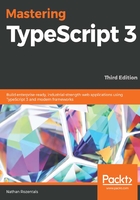
上QQ阅读APP看书,第一时间看更新
Conventions used
There are a number of text conventions used throughout this book.
CodeInText: Indicates code words in text, database table names, folder names, filenames, file extensions, pathnames, dummy URLs, user input, and Twitter handles. Here is an example: "This gruntfile.js is necessary to set up all of the Grunt tasks."
A block of code is set as follows:
test = this is a string
test = 1
test = function (a, b) {
return a + b;
}
When we wish to draw your attention to a particular part of a code block, the relevant lines or items are set in bold:
declare function describe(
description: string,
specDefinitions: () => void
): void;
Any command-line input or output is written as follows:
npm install -g typescript
Bold: Indicates a new term, an important word, or words that you see on screen. For example, words in menus or dialog boxes appear in the text like this. Here is an example: "Select System info from the Administration panel."
Warnings or important notes appear like this.
Tips and tricks appear like this.